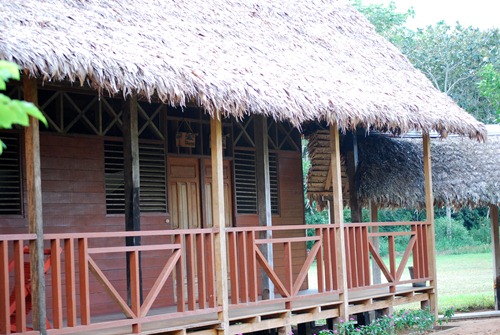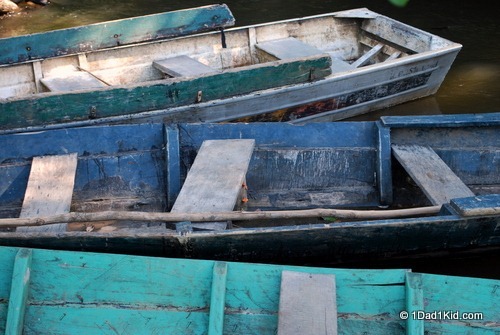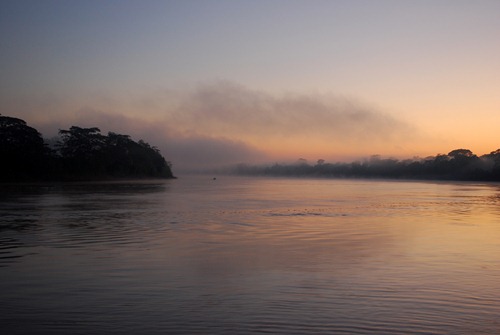Greenwashing is a form of spin in which green PR or green marketing is deceptively used to promote the perception that an organization’s products, aims or policies are environmentally friendly.
Whether or not you believe in human-caused climate change, one can’t deny that “going green” is a big business. While there are certainly more sustainable activities and experiences, a huge portion of what gets called green is actually just greenwashing.
Sustainability and going green can be tough things to actually live. For instance, I know some green snobs advocates who own swimming pools. They rarely use a pool cover (which helps reduce evaporation to the tune of 1000 gallons a month), and it is estimated that the average swimming pool results in the use of 30,000 gallons of water a year.
If a pool has even a small leak, it can waste over 100,000 gallons.
Is that sustainable or eco-friendly? Hardly.
Exploring nature is eco-friendly, right? It’s extremely sustainable to go for a hike in the wilderness to watch the Northern Lights, right? This is something I want to do badly. And this is where greenwashing comes in. Too often a well-meaning individual wants to do something sustainable and green, but they tend to focus only on the activity or specific lodging rather than looking at the whole picture.
For instance, for my dream Northern Lights trip to Iceland, I would have to take at least one flight. It is estimated that flying from NYC to Iceland’s capital would produce 1.27 metric tons of carbon dioxide emissions. To put that into a different perspective, a 2000-mile road trip in a medium-sized car produces around 0.74 metric tons.
While in Iceland, I’d of course have to drive or be part of a tour group to go to my location. Since I’d want to maximize my viewing potential, I’d want to be somewhere more remote so I wasn’t fighting city lights during my inspirational moment. If I stay at a hotel, lodge, etc., they have to bring in food, which will be brought in by a larger, less eco-friendly, vehicle most likely. Most likely, they also aren’t washing the linens in the local river.
Chances are the staff working at the hotel don’t live in the same building, so they’re likely driving in to work, which is also producing more carbon emissions.
If we take a deep enough look, we can see that our green activity really doesn’t end up being all that green in the long run. Something that people who tend to gush about green travel seem to ignore. “Well, my hotel is eco certified!” I’m sure it is.
Since you aren’t teleporting to your hotel, however, how green is your trip really?
While I was in Peru the first time, I stayed in an eco-lodge in the rain forest. (They didn’t market themselves in that direction, though.) It ticked almost all the boxes for being eco-friendly. Most of our activities included being on a boat, canoe, or our own two feet. The food was from local farms. But to get there, I had to fly, take a car ride, ride a ferry, and get on a bus. And, of course, I had to do the same thing for the return trip.
There’s no way I’d call that trip green travel, though.
I looked at another “green” lodge in a different country which also sounded quite wonderful. Until I saw that it would require at least 3 long flights plus a boat ride or a puddle jumper to get there. Sure, the lodge is green but getting there isn’t. I’ve checked out other eco-lodges and upon further research discovered that quite often there was really very little eco about them.
I think it’s interesting to note that some of the “experts” haven’t even thoroughly thought things out. One has to really wonder when the co-founder of a center for responsible travel makes the statement that she “hadn’t thought of the treatment of animals as a major issue in responsible travel.” (source)
I’m also talking to those people who pride themselves on being so green while driving their non-hybrid, gas-guzzling SUVs on their way to yoga while making sure to stop by Starbucks for their morning latte.
Perhaps some people view the themes of sustainable, green, and responsible travel as beings separate things. Perhaps they are; however, I feel they are so interlinked that one can’t really focus on just one aspect.
Can we travel in a more eco-friendly or sustainable way? Sure! In Europe, we did train travel as much as possible. Taking the train can cut emissions from a journey by up to 90%.
But let’s cut the crap and the greenwashing and admit that most long-haul trips, and many short ones, are anything but green.
There are things we can do to reduce our footprint. Some of them are more casual than others, but I’m of the philosophy that every little bit helps. There are green warriors out there who will weave their clothing on a loom using fibers from a plant grown in the most sustainable way imaginable, and I applaud them for their efforts.
I respect the people who do their best to reduce their impact, and I’m trying to do better at it myself. However, will I choose a 1-1/2-hour flight over an 18-hour bus ride? Hell yes! But I never touted myself as being a green traveler either. I try to travel as responsibly as possible, but I’m also going to keep my comfort, budget, and time in mind.
I’m just being honest.
Now if all the people doing greenwashing would just do the same.
What examples of greenwashing have you seen? How can people travel in ways that are more respectful of the environment and local people?








January 21, 2018
Air travel is fundamentally unsustainable and emits massive quantities of GHG’s at an altitude where their impact is multiplied X3. By comparison, the impact of what you do once you get there is much less important. Except in the cases of dire family emergencies I never fly. As individuals and as a society we have not been even remotely committed to making the fundamental changes necessary to live sustainably. We all need to again get used to vacationing within our own regions and if we really need to travel long distances take the bus or train.
October 27, 2015
I agree with you. I’m trying to be as green as possible but the act of travel in itself is not the easiest way to be green, let’s face it. Still, I think that every step is important, every small gesture can make a difference. Even greenwashing in the end, because whoever is staying at the ecolodge you mentionned is basically saying to the whole tourism industry “I want green accommodations”, so that’s still better than not going, right ? 🙂
October 29, 2015
I absolutely agree every little bit helps.
Unfortunately, with green washing we get lots of places simply claiming they’re green to capitalize on that group of travelers without actually doing any of the things that would make them more green.
October 13, 2014
It would be nearly impossible to be 100% green but I agree that there are definitely lots of small things that you can do to make a difference. I walk between places as much as possible and take public transport when it is too far to walk. I never waste food. I don’t buy bottled water unless I am in a country where the water is unsafe to drink. I choose overland travel rather than flying when I can. My next step is to cut down more on eating meat.
October 16, 2014
Totally agree. And if a lot of us doing even small things, it all adds up.
October 8, 2014
I wonder how many dolphins we’re killing through ocean acidification via the act of traveling alone. (Gotta just go straight to the core of all controversies in one sentence). I mean, just one international flight per year is a significant amount of CO2 pumped into the environment that leads to ocean acidification and death of just about everything. That is before we even get to the topic of what we do when we get there.
I do appreciate when resorts try and be “green”, and I’m not talking about a chain printing 50,000 signs saying they won’t change your towels every 48 hours, either. (I’d love to see the life-cycle analysis on that one). Short of closing down altogether (which would stop all of those pesky flights), I like to see hotels doing what they can to limit their own impact on the environment. If people are going to come regardless, it is better than nothing.
But although I’m all for going green and being ethical, I know that my lifestyle is anything but. I think this post is going to force me to put together my environmental piece sooner rather than later, because I’ve been meaning to publish one since this is what my college education was (somewhat) focused on.
October 12, 2014
I don’t think most people are going to be willing to radically change how they live. Hell, just a state banning one-use plastic bags for grocery shopping has caused a massive controversy. BUT that doesn’t mean there aren’t small things they we can all do. Even a bunch of small things can have a huge impact if enough people are doing them.
October 8, 2014
Even Green washing is a step in the right direction. As much as I dislike the Prius for its ecological damage in its cradle to grave life, it is move toward a cleaner future. It gets people thinking. Now if they would research more. If they are thinking a little now they will think more later, I hope. The biggest problem, since we discovered that heat can be transferred into energy, is that our infrastructure is based on and relies on the use of a product that is damaging to the environment. And it was not made apparent until it was engrained into us so deeply that to change will take a monumental amount of energy (literally and figuratively).
If we all work at it a little then it will make an impact. If we all work at it a lot then it will make a difference. Make a conscious effort and make a difference. Encourage others to start any way possible.
October 8, 2014
It depends on the situation. I have seen some places label themselves as green when really there wasn’t anything they were doing that would warrant that label. At that point they’re just taking advantage of a marketing tool.
I definitely agree that even little things help, especially when done by a lot of people.
October 8, 2014
Not a lot of travelers know how to travel responsibly, to be honest, I’m also learning.. and its great that we are raising awareness..
I think the best way for us travelers to understand the impact of our action is to not just go and visit but to also volunteer in a country that is so much affected by the cause of these carbon wastes.. But then again, there’s not a lot of travelers who do that..
October 8, 2014
Traveling to a country to volunteer probably isn’t very green either. One really has to consider all the elements if they wish to be a responsible traveler.
October 6, 2014
I struggle with this a lot as sustainability/conservation/energy etc is my passion (and my job) I am a marine conservation scientist but I so LOVE travel and that’s my other passion 🙂 We try to minimize our footprint while travelling (either not flying, treading light wherever we are etc etc) but it’s not possible always…I do agree with the other commentors that it’s about making those sustainable choices, when possible, every step of the way..
I get lot of grief from people once I started blogging about our travels, about my carbon footprint etc. and I think it’s important to be aware of my actions, as you said in the article, about not being ‘greenwashed’ into thinking somethings are eco friendly, when you have to look at the bigger picture to really assess whether it is.
October 7, 2014
While being green is an element of them all, I think the real focus should be on responsible travel. Green travel is a myth for about 99.9% of travelers. Unless you’re walking, sleeping outdoors, etc., it isn’t truly green when you factor in every component. However, there are practical things we can do to reduce the ecological impact of our travels while also enhancing the experience and the lives of the locals. I think that’s the important part to focus on.
October 6, 2014
I agree with Raphael 100%. Being “green” or “responsible”is about making the most sustainable, eco-friendly choices you possibly can every step of the way.
It’s not just about how you get to a place in the time allotted, but also how you get around, how you treat the local people, how you spend your money, etc. It’s a million little choices people have to make every day, not just when they travel, but also when they’re at work or at home.
And it’s not about shaming those who make different choices, but about offering them better alternatives to consider next time around. Because most people don’t understand how the little things can add up to make a big difference. Education is the key.
It’d be really nice, in a perfect world, if everyone’s lifestyle allowed them the luxury of slow, overland travel. But unfortunately that’s not the reality most people who travel face. We believe that EVERY traveler can be more green by making simple, sustainable choices.
October 7, 2014
There are definitely things people can do to help minimize their ecological impact. I think people mean well but don’t dig deeply enough. I plan on some future articles with practical tips on how to travel more responsibly.
October 8, 2014
Because nothing says green or conservationist like saying yes to dolphinariums!
No one is perfect but at least Talon is intellectually honest and consistent.
October 8, 2014
Thank you for that recognition!
October 6, 2014
The only way to travel by being 100% eco-friendly is to walk. Even bicycles contain plastic and other non eco friendly materials!
October 7, 2014
Absolutely! Walking and primitive camping are really the only green travel activities. Working toward more responsible travel is the key I believe.